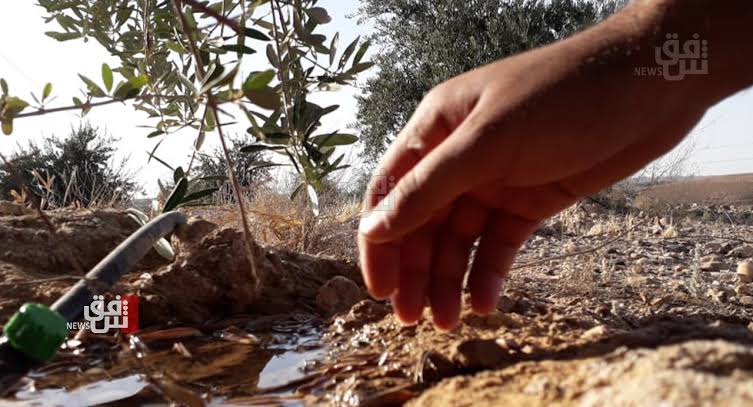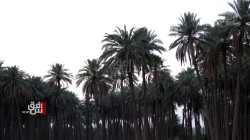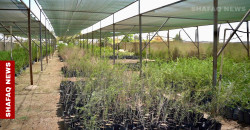Iraq loses a strategic asset: Challenges and economic significance of sesame cultivation

Shafaq News / The Iraqi agriculture faces numerous challenges such as climate change and water scarcity, which have resulted in the loss of agricultural crops, including sesame, despite its resilience and adaptability to these conditions.
Sesame is described as a summer oilseed crop belonging to the Pedaliaceae family. Its scientific name is Sesamum indicum and it is a herbaceous plant that typically reaches heights of 1-2 meters.
It is believed that sesame's native habitat is in tropical regions, and it has been known in Africa and East Asia since ancient times. From there, it spread to other parts of the world, with major sesame-producing countries today being India, China, Sudan, Turkey, and Mexico.
Studies suggest that sesame cultivation dates back to ancient Mesopotamia, which is modern-day Iraq, as early as 3000 BCE.
Sesame Crop:
The total global area cultivated with sesame in 1974 was approximately 6,195 thousand hectares, with an annual total production of around 1,944 thousand metric tons, averaging 314 kg per hectare.
In Iraq, the total area cultivated with sesame in 1974 was slightly over 4,644 thousand dunams, with a total production of about 6,341 thousand metric tons, or an average of 137.3 kg per dunam. Sesame is grown as a summer crop in most Iraqi governorates, with al-Anbar, Wasit, Saladin, Diwaniya, Thi Qar, and Diyala being among the top producers.
In 2019, the Ministry of Agriculture reported that the planned area for sesame cultivation in Iraq was 32,786 dunams, covering most governorates, including al-Anbar (8,730 dunams), Wasit (7,019 dunams), Saladin (5,200 dunams), Diwaniya (4,080 dunams), Thi Qar (3,560 dunams), Diyala (1,050 dunams), Babil (525 dunams), Baghdad (520 dunams), Nineveh (520 dunams), Maysan (250 dunams), and Karbala (55 dunams).
The Ministry of Agriculture attributed the increase in sesame cultivation to the availability of water, emphasizing the economic importance of sesame as a cash crop.
Due to water shortages, Iraq has lost several agricultural crops, including sesame, cotton, sunflowers, and maize, after reducing the summer cultivation plan, according to Arkhan Meryoush, the director of agriculture in Wasit governorate.
Meryoush confirmed that Wasit, along with central Euphrates governorates, used to be known for sesame cultivation, with a focus on northern areas of the governorate, such as al-Shuhaymiyah, al-Suwaira, and al-Azeeziyah, spanning an area of 6,000 to 7,000 dunams.
Economic Significance:
Sesame seeds possess several valuable qualities. They contain 50-56% oil, which is primarily used in the production of liquid vegetable oils. Sesame oil does not become rancid easily due to the presence of Sesamoline, which provides antioxidative properties during degradation, preventing the oil from spoiling.
Sesame seeds are used as food toppings on bread, pastries, snacks, sweets (halva), and tahini, which is a staple in the Iraqi breakfast table, especially during winter, as it provides high-calorie content and is low in saturated fats.
Additionally, sesame is used as animal feed for poultry and livestock, known for its high mineral and protein content, containing 10.5% minerals and 27.5% protein.
Sesame oil is employed in various industries such as dyes, soaps, perfumes, pharmaceuticals, insecticides, and lubrication, and its stems and leaves can be used for fuel.
However, many industrial crops, including sesame, have seen reduced cultivation across the country due to marketing difficulties and the absence of facilities or factories for processing into other food products, as stated by the director of agriculture in Wasit.
Arkhan Meryoush concluded by saying, "The Iraqi economy primarily depends on crude oil and does not prioritize industrial crops that fall within the manufacturing industries, such as sesame, sunflowers, maize, cotton, and others. As a result, the cultivation of these crops had been declining even before the water shortage."

